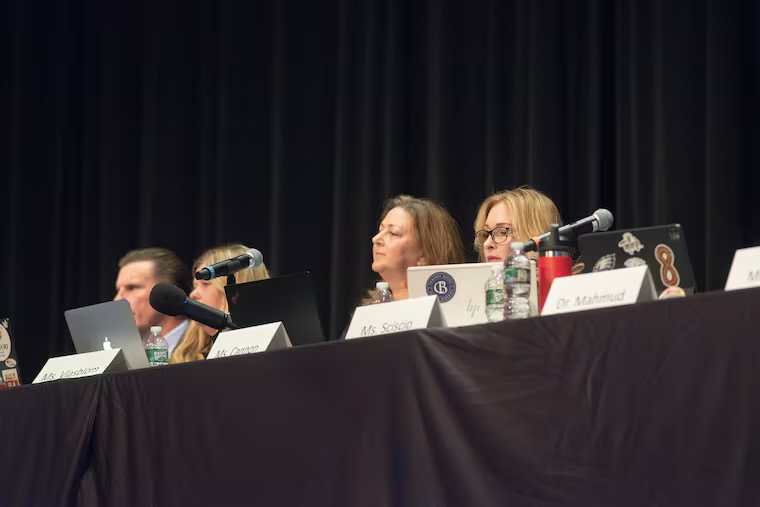Two Central Bucks Republicans resign from school board in dispute over district solicitor
In resignation letters submitted earlier this week, Lisa Sciscio and Debra Cannon both alleged that solicitor David Conn has conflicts of interest undermining his representation of the district.

The Central Bucks school board is expected to accept the resignations Friday of two Republican members, who are accusing the board’s new Democratic majority of choosing a solicitor with “personal and political scores to settle.”
In resignation letters submitted earlier this week, Lisa Sciscio and Debra Cannon both alleged that David Conn, chosen by Democrats as the board’s new solicitor after the bitterly fought November election, has conflicts of interest undermining his representation of the district.
They pointed to Conn’s marriage to Marlene Pray, director of the Rainbow Room, a Planned Parenthood-sponsored LGBTQ youth center in Doylestown, and Pray’s serving as a witness for Andrew Burgess, the teacher who last year sued Central Bucks alleging it retaliated against him for helping a transgender student.
A report by the Duane Morris law firm, hired by the former Republican board majority, found no evidence that the district had created a hostile environment for LGBTQ students, and instead pinned blame on Burgess, saying the teacher failed to report bullying in order to file a civil rights complaint that would be “weaponized” by the board’s opponents.
Sciscio and Cannon noted that Conn, a partner with Sweet, Stevens, Katz and Williams, entered his appearance on behalf of the district in Burgess’ lawsuit in December. On Wednesday, he withdrew from the case.
“At no time was I ever asked to, nor did I intend to, participate in the litigation,” Conn said Thursday. He said he was asked by the district’s insurance company “to engage in a limited scope of representation, which I fulfilled late last week, hence my withdrawal of appearance.”
As for allegations about his motivation, Conn said, “I do not have any scores to settle, but we do have some messes to clean up.”
Partisan battles remain
The board’s 6-3 Democratic majority has moved quickly to reverse actions of its Republican predecessors — from suspending its restrictions on library books and the classroom display of Pride flags and other “advocacy” materials, to authorizing an investigation into the $700,000 payout awarded in the days after the board election to former superintendent Abram Lucabaugh.
At the same time, the new board has continued to be mired in partisan battles. Republican community members petitioned for recounts; the results reflected wider margins of victory for Democrats.
In the new board’s first meeting in December, the outgoing Republicans refused to place the new Democratic majority’s requested items on the agenda, leading the Democrats to add them by an emergency motion. Republicans then sued the board, alleging that the last-minute additions violated Pennsylvania’s Sunshine Act.
Meanwhile, members of the Republican minority say Democrats have ignored their concerns and excluded them from decision-making. In her resignation letter, Sciscio said that after she requested a written memo about an executive session she missed, she was “accused of collaborating with opposing counsel.”
Sciscio also said that Conn had “threatened the board minority with personal legal action related to this matter on at least three occasions.”
It wasn’t clear from Sciscio’s letter specifically what matter she was referring to, though during comments at a school board meeting last week, she described the investigation into Lucabaugh’s separation agreement as a “witch hunt.” The board majority abruptly adjourned the meeting, saying that Sciscio’s comments were touching on executive session discussions.
Neither Sciscio nor Cannon — who accused Conn of “attempted blackmail” in her resignation letter, and said she was “left with no choice but to protect the financial welfare and livelihood of me, my husband, my children, and my family” — returned requests for comment this week.
Conn on Thursday said he couldn’t provide context for Sciscio and Cannon’s allegations without “violating more confidentiality than they already did,” but said, “At no time did I threaten anyone with anything.”
Karen Smith, the board president, said Conn had advised Sciscio that if she spoke with Lucabaugh or anyone working for him, she could be deposed.
“I don’t think that’s a threat,” Smith said. “I think that’s a fact.” She said details of the board’s negotiations with Lucabaugh were “privileged executive session material.”
Smith said it wasn’t the board’s practice to provide written summaries of executive sessions, which the board would have to pay its lawyer to do. She said she and Conn had instead offered to speak with Sciscio to share information orally.
Smith also denied any “quid pro quo” regarding the board hiring Conn as its solicitor after he appeared on behalf of her and two other Democratic board members in the recount cases.
“There are allegations about corruption and liability in these letters,” Smith said in a statement. “I want to reassure our community that we take our responsibility to our students and our community extremely seriously, and these allegations are false.”
Smith also said that as members of the Republican majority, Sciscio and Cannon “routinely withheld information” from Democrats in the minority, and ignored warnings about the legality of district policies from advocacy groups such as the ACLU and Education Law Center.
“Their actions caused these lawsuits they are now accusing us of mishandling,” Smith said.
Central Bucks isn’t the only district that flipped to Democratic control and that now is facing backlash over its choice of solicitor; in nearby Council Rock, critics have also accused Democrats of having political motivation in hiring a new solicitor.
Since the Central Bucks board’s partisan split is 6-3, the resignation of Sciscio and Cannon won’t change the balance of power. The board will have 30 days to choose new members, Smith said; a process for potential applicants will be outlined on the district’s website Saturday.